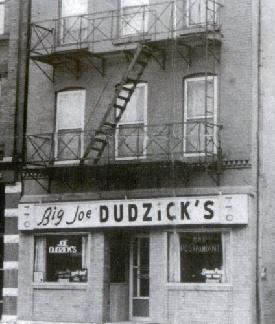 |
| 770 Seneca Street, Buffalo, NY |
|
It may not look like much anymore — just a small parking lot behind a green chain-link fence. But to thousands of theatergoers in Western New York and across the United States, 770 Seneca St. stands for something a lot bigger. To them, the patch of earth on the once-bustling East Side symbolizes Buffalo itself — hardworking, shirtsleeve, blue-collar Buffalo of the 1950s, full of men who knocked back a few beers after a long day at the factory and capable women who made the cole slaw scooped onto their fish fry plates, from scratch, every Friday. That’s the image of Buffalo that the play “Over the Tavern” sent out to the world. Now the site of the original “Over the Tavern” tavern has a brand-new historical marker all its own.
Monday, playwright Tom Dudzick came to Buffalo from his home downstate to get a first look at the city marker, a 2-foot-square slab of bronze that commemorates his achievement — and the lifework of his father, Joe Dudzick. “Man,” Tom Dudzick said in reverent tones, kneeling to touch the marker sunk in the sidewalk outside the spot where his childhood home once stood, “I feel like now I’ve accomplished something. It’s a heady thing — to think that I’ve accomplished this.”
The lot on Seneca Street was the site of Big Joe’s Tavern from 1946 to 1966. The city installed the marker late last fall, Dudzick said. Calls to City Hall about the marker were not returned late Monday.
“Big Joe” Dudzick, who earned his nickname for his stature — 6 feet, 11 inches — was a star basketball player at Canisius College in the 1930s. He went on to careers in both barkeeping and politics. He served two terms as an at-large member of the Buffalo Common Council before being unseated by Alfreda Slominski in 1967. All the while, he was running the popular Big Joe’s, which poured drinks for workers from the neighborhood — the Larkin complex stood nearby, among other employers — and served up beef-on-weck and kielbasa at lunch, and homemade fish fries on Fridays.
“I remember sitting at the bottom of the stairs that separated our apartment from the tavern, and the jukebox playing and the men laughing,” Tom Dudzick recalled. “If it wasn’t busy, I would sit with some Squirt and potato chips and watch Jackie Gleason.”
Both Joseph Dudzick and his wife, Alice, worked in the family business, making their home above the bar. They had five children — Carol, Paul, Joan, Michael and Tom. Later the Dudzick family moved out of the tavern and into a home in North Buffalo. In “Over the Tavern,” the bar is “Chet’s Bar and Grill,” owned by a family called the Pazinskis. The play is told through the point of view of the family’s 12-year-old son, Rudy, a stand-in for the playwright as a boy.
The historical marker reads: On This Spot 770 Seneca Street Stood “Big Joe” Dudzick’s Tavern (1946-1966), Boyhood Home Of Playwright Tom Dudzick, Inspiration For “Chet’s Bar and Grill,” Immortalized In His Play “Over the Tavern” First Presented By Studio Arena Theatre in 1994.
Alice Dudzick lived to see “Over the Tavern” premiere in Buffalo. Joseph Dudzick did not; he died in 1990. The three-story building that used to be Big Joe’s was torn down during the 1980s. Now a custom-canvas business occupies the site and has turned the lot into a parking area. Tom Dudzick, a graduate of Fredonia State College, moved away from Buffalo in 1979 and today lives in Nyack with his wife, Holly Caster, also a writer, and their children, Emma, 14, and Charles, 16. Gazing around at his old neighborhood Monday, Dudzick predicted a renaissance. Some new businesses have bought up properties in the area, he said, and are planning to revive some of the buildings. “I know someday this neighborhood’s going to come back up,” he said. “And people will stop here and look at the marker, and say, ‘Oh, I saw that play! And this is where it all started.’
|